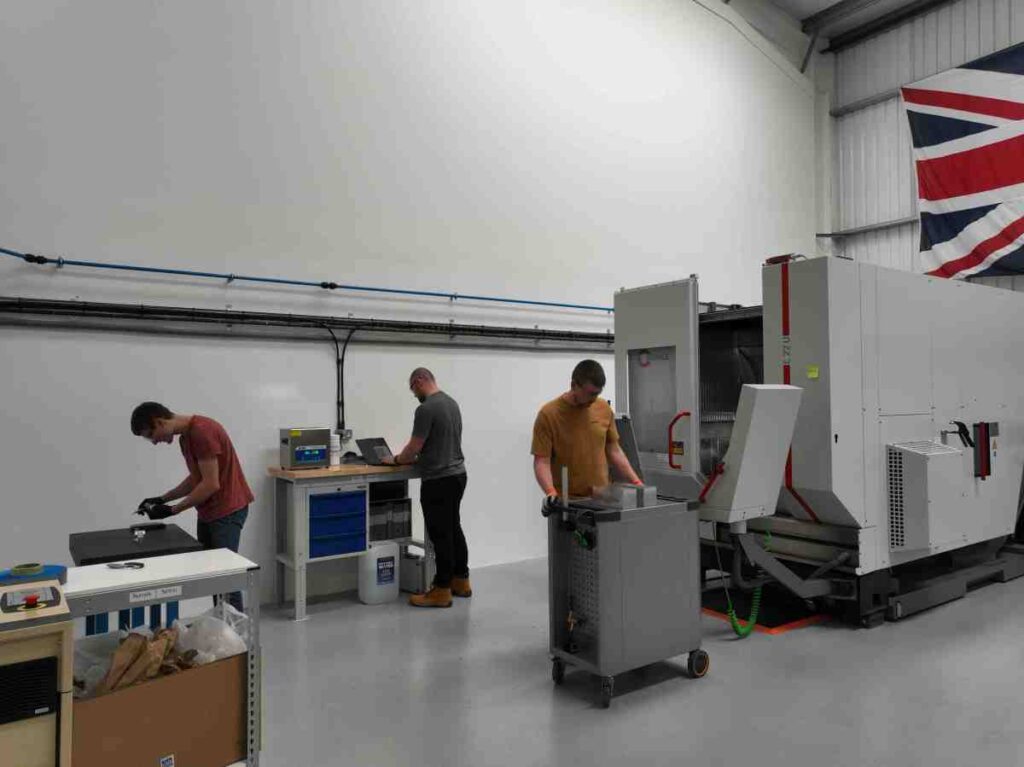
Reshoring Manufacturing UK: Isembard Startup Secures $9M to Revolutionize British Production Capabilities
Reshoring Manufacturing UK: Isembard Startup Secures $9M to Revolutionize British Production Capabilities
Isembard’s innovative approach to reshoring manufacturing in the UK involves smaller, distributed production facilities connected by proprietary software | Photo Credit: NewsToday360
Table of Contents
- Reshoring Manufacturing UK: The Challenge of Rebuilding Capacity
- Isembard’s Innovative Approach to Precision Manufacturing
- The Distributed Factory Model: A New Paradigm
- MasonOS: The Technology Powering Manufacturing Transformation
- Target Industries and Market Strategy
- $9M Funding Round and Growth Plans
- Beyond Britain: A Vision for Western Manufacturing Revival
Reshoring Manufacturing UK: The Challenge of Rebuilding Capacity
The drive toward reshoring manufacturing UK capabilities has gained significant momentum in recent years, propelled by geopolitical tensions, supply chain vulnerabilities exposed during the pandemic, and growing concerns about national security. This reshoring movement represents a critical shift in industrial strategy as Western nations seek to rebuild domestic production capacity that had been outsourced to lower-cost countries over recent decades.
However, the path to successful reshoring manufacturing UK operations faces substantial obstacles. In the crucial domain of precision manufacturing, Britain and other Western countries are confronting the consequences of decades of industrial hollowing out. The infrastructure, skilled workforce, and competitive capabilities required to handle modern production demands have significantly atrophied as manufacturing migrated to Asia.
This gap in the UK’s manufacturing landscape presents both a challenge and an opportunity for innovative solutions in reshoring manufacturing UK capabilities. The legacy suppliers who remained operational during the offshoring era often struggle with fragmented supply chains, outdated facilities, and a diminishing pool of skilled operators – many of whom have retired or transitioned to different sectors as manufacturing declined in the UK.
Key Challenges in Reshoring Manufacturing UK
- Fragmented and outdated manufacturing infrastructure
- Shortage of skilled operators and engineering talent
- Legacy systems and processes unable to meet modern production demands
- Competition from established low-cost manufacturing hubs
- High capital expenditure requirements for new facilities
- Complex regulatory and compliance landscape
Isembard’s Innovative Approach to Precision Manufacturing
British startup Isembard has emerged as a pioneering force in the reshoring manufacturing UK movement, taking a radical approach to rebuilding the nation’s industrial capabilities. The company, which secured £7 million (approximately $9 million) in seed funding, is developing a network of manufacturing facilities across Western locations with a focus on high-precision parts production.
Isembard’s first operational facility launched in London in January, already equipped to fulfill requests for high-precision components, according to CEO Alexander Fitzgerald. This represents a significant milestone in the journey of reshoring manufacturing UK capabilities, particularly for critical industries that require specialized parts with exacting specifications.
The startup’s business model targets companies that traditionally wouldn’t invest billions in their own manufacturing facilities but instead contract with third-party producers – often overseas. Fitzgerald outlined the simplified process: “Let’s say you are making an uncrewed aerial system, like a drone. You’ll send us a design for some key parts for that in a 3D file. We’ll give you a quote for how fast we can do that, and the price. And then we machine that part out of whatever material is required, and we ship it to you. And sometimes maybe we’ll do the actual final assembly.”
While this service model isn’t fundamentally different from working with overseas manufacturers, it aligns perfectly with the growing imperative for reshoring manufacturing UK operations to create more resilient, sustainable, and strategically secure supply chains. By establishing local production capabilities, Isembard addresses the growing concerns about overextended global supply networks and dependencies on potentially unreliable foreign suppliers.

Isembard’s advanced manufacturing capabilities enable the production of high-precision components for critical industries, supporting the reshoring manufacturing UK initiative | Photo Credit: Isembard
The Distributed Factory Model: A New Paradigm
A distinctive aspect of Isembard’s approach to reshoring manufacturing UK operations is its deliberate departure from the traditional large-scale factory model. Rather than following the capital-intensive path of American counterparts like Hadrian, which raised over $216.5 million in 2024 for manufacturing modernization, Isembard has adopted a more distributed and agile strategy.
“We take the view that it takes too long, too much capex, and too much concentration of talent in one single place to build these large, 100,000 square-foot factories,” Fitzgerald explained. “What we’re actually doing is a distributed factory model where we have lots of much smaller units, but all with the same operating model technology and automation.”
This distributed approach to reshoring manufacturing UK capabilities offers several strategic advantages. It reduces the initial capital requirements, accelerates time-to-market, and allows for more strategic facility placement based on customer needs, talent availability, and logistical considerations. Additionally, this model creates inherent resilience – if one facility faces disruption, others in the network can compensate, preventing the single points of failure that have plagued traditional manufacturing operations.
Distributed vs. Centralized Manufacturing
Isembard’s distributed approach to reshoring manufacturing UK differs from traditional models in these key ways:
| Distributed Model (Isembard) | Traditional Centralized Model |
|---|---|
| Lower initial capital expenditure | Massive upfront investment required |
| Faster facility setup and operation | Extended construction and commissioning timelines |
| Inherent supply chain resilience | Vulnerable to single-point disruptions |
| Geographically dispersed talent requirements | Concentrated talent needs in one location |
| Consistent capabilities across multiple sites | Typically specialized by location |
MasonOS: The Technology Powering Manufacturing Transformation
Central to Isembard’s vision for reshoring manufacturing UK capabilities is MasonOS, its proprietary software platform that connects and powers the company’s distributed manufacturing facilities. This unified digital foundation enables Isembard to achieve economies of scale across its operations while maintaining flexibility and responsiveness to customer requirements.
Fitzgerald described MasonOS as a comprehensive system that handles “everything from quoting and estimating work to a customer, through to managing our own supply chain, automating scheduling and the prioritization, but also the core manufacturing and how you code the machines themselves.” This represents a significant technological advancement for reshoring manufacturing UK operations, which have traditionally relied on outdated systems or manual processes.
“At the moment, the problem is either that’s all paper-based or it’s all software built in the 70s,” Fitzgerald noted, highlighting the technological gap that has hindered modernization efforts in British manufacturing. By developing a purpose-built, modern software platform, Isembard is creating the digital infrastructure necessary for efficient and competitive reshoring manufacturing UK operations in the 21st century.
MasonOS Capabilities Supporting Reshoring Manufacturing UK
- Real-time quoting and scheduling across the facility network
- Integrated supply chain management and optimization
- Automated machine programming and configuration
- Quality control and verification systems
- Production analytics and performance monitoring
- Consistent operations across distributed facilities
Target Industries and Market Strategy
Isembard’s initial market strategy for reshoring manufacturing UK operations deliberately focuses on sectors where domestic production capacity is not merely an economic advantage but a strategic imperative. The company is targeting aerospace, defense, and energy industries – all critical to national security and economic resilience.
While Fitzgerald declined to name specific clients, he revealed that Isembard has gained significant early traction with defense sector customers and fast-growing startups. This initial customer base represents areas where reshoring manufacturing UK capabilities is particularly urgent due to geopolitical considerations and the need for secure supply chains.
The CEO also mentioned ongoing discussions with prime contractors and government bodies, suggesting Isembard’s potential role in broader national initiatives to strengthen domestic manufacturing. This aligns with increasing government emphasis on reshoring manufacturing UK capabilities for strategic industries, particularly following supply chain vulnerabilities exposed during recent global disruptions.
“We want to help solve industrialization for the West.” — Alexander Fitzgerald, CEO of Isembard
$9M Funding Round and Growth Plans
The £7 million (approximately $9 million) seed funding round represents a significant milestone in Isembard’s mission to advance reshoring manufacturing UK capabilities. The investment was led by Notion Capital, with participation from an impressive roster of investors including 201 Ventures, Basis Capital, Forward Fund, Material Ventures, Neverlift Ventures, and NP-Hard Ventures. Notable angel investors including EU Inc promoter Andreas Klinger and SpaceForge founder Joshua Western also participated in the round.
This substantial early-stage funding underscores the growing investor confidence in the reshoring manufacturing UK movement and the strategic importance of rebuilding domestic production capabilities. It also validates Isembard’s unique approach to addressing this challenge through distributed manufacturing facilities connected by advanced software.
Prior to this funding round, Isembard was self-funded with proceeds from Fitzgerald’s previous venture, Cuckoo, which he sold to Giganet in 2022. This entrepreneurial background has likely influenced the company’s approach to reshoring manufacturing UK operations, emphasizing capital efficiency and technological innovation rather than simply replicating traditional manufacturing models.
With just 12 employees currently, Isembard is poised for significant growth as it expands its network of facilities and develops its technology platform. The funding will presumably accelerate these expansion efforts, facilitating the company’s contribution to reshoring manufacturing UK capabilities across critical industries.
Beyond Britain: A Vision for Western Manufacturing Revival
While Isembard’s initial facility launches in London, the company’s ambitions for reshoring manufacturing UK capabilities extend far beyond British borders. Fitzgerald articulated a broader vision that encompasses revitalizing industrial production across Western nations, potentially expanding to North America, Australia, and New Zealand.
This international perspective on reshoring manufacturing UK and Western manufacturing more broadly reflects the global nature of the challenge. The industrial hollowing out experienced in Britain has parallels across many developed economies, creating similar needs for innovative approaches to rebuilding domestic production capabilities.
Isembard’s name itself speaks to this ambitious vision. With a slight spelling modification from the original (which was already in use), the company pays homage to Isambard Kingdom Brunel, the renowned British engineer and industrialist who made significant contributions during the Industrial Revolution. The company also references Brunel’s father in its manifesto, noting how he established a shoe factory after observing British soldiers returning from war with injured feet due to poor-quality footwear – a historical example of addressing critical supply chain vulnerabilities through domestic manufacturing.
Reshoring Manufacturing UK: Broader Implications
The movement toward reshoring manufacturing capabilities extends beyond economic considerations, addressing:
- National security and defense readiness
- Supply chain resilience against global disruptions
- Reduced carbon footprint from shorter logistics chains
- Preservation and development of critical industrial knowledge
- Creation of high-skilled manufacturing employment
- Technology development and innovation ecosystems
Interestingly, Fitzgerald’s motivation for advancing reshoring manufacturing UK capabilities has personal dimensions beyond business opportunity. Though his family has no military background, he described having “always had a sense of patriotism” and has served as a military reservist since 2016. This connection to national service appears to have influenced Isembard’s mission, particularly its focus on defense and other strategically critical industries.
As geopolitical tensions continue to reshape global trade relationships and supply chain strategies, Isembard’s innovative approach to reshoring manufacturing UK operations represents a timely response to growing demands for domestic production capabilities. By combining distributed manufacturing facilities with advanced digital technologies, the company is creating a model that could help revitalize industrial capacity not just in Britain, but across Western nations facing similar challenges.
Published on April 24, 2025 | Last Updated: April 24, 2025





